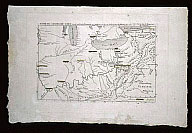Fort Necessity

When 21-year-old Major George Washington returned to Williamsburg, Virginia, from his mission to Fort Le Boeuf (in western Pennsylvania) in January 1754 with the news that the French would not withdraw from the Ohio country, Lieutenant Governor Robert Dinwiddie followed orders he had received from the British government to expel them from the region. In 1754, Dinwiddie and the Virginia assembly created a regiment of 400 men commanded by a member of the House of Burgesses, Joshua Fry, an Oxford-educated surveyor and former master of the grammar school at the College of William and Mary. A small detachment, under the command of Washington (appointed lieutenant colonel and second-in-command of the new force) was sent forward to prepare a road from Wills Creek, Maryland, to Redstone Creek on the Monongahela River in southwest Pennsylvania. When he reached Great Meadows, Native allies alerted him that a small number of French soldiers were in a concealed encampment several miles to the north. Washington decided to go on the offensive. During a surprise morning attack on May 28, 1754, Washington lost control of his Native allies, who murdered ten French prisoners, including their leader, Ensign Joseph Coulon de Villiers, Sieur de Jumonville.
Unfortunately for Washington, one of the Frenchman escaped to inform his comrades at Fort Duquesne, under the command of Jumonville's brother, about what happened. Rather than retreat to Virginia, believing he would soon be reinforced, Washington decided to hold his position at Great Meadows and there built Fort Necessity. The rest of the Virginia regiment reached the fort on June 9 with the news that Fry had died, which put Washington in command. A few days later, an infantry company of British regulars from South Carolina joined them. On the morning of July 3, a combined force of about 700 French and Natives arrived. Believing what he read in his military manuals, Washington expected to fight them on the open fields outside Fort Necessity. Instead the French and Indians took up positions on the wooded hill sides that surrounded the fort. During a steady rain, the fighting continued into the early evening with the French having a distinct advantage, inflicting heavy casualties on Washington's troops. Because France and Great Britain were not at war, the French commander offered Washington an honorable surrender, which he accepted. What Washington did not know, because he could not read French, was that when he signed the articles of surrender, he admitted he had assassinated a French envoy. Nevertheless, when Washington returned to Williamsburg with his defeated troops on July 17, he was greeted as a hero.





